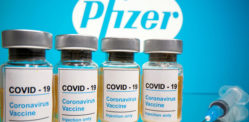"It’s likely that the disease will circulate and be endemic."
A study shows the Covid-19 vaccine which was developed at Oxford University works “perfectly” to build strong immunity against the virus.
With the number of cases rising again in the United Kingdom, hopes for a coronavirus vaccine are high.
During its early trials, the vaccine was shown to safely trigger an immune response in volunteers.
A report by the the Daily Mail says, the Oxford vaccine does not work like traditional vaccines.
Typically, a vaccine is designed using a weakened virus or a smaller amount of it. However, the Oxford virus works to make the body create a part of the virus itself.
According to researchers at the University of Bristol, the discovery of this technology works for the virus.
The study revealed that a person’s immune system is primed to recognise Covid-19 after the vaccine delivers instructions for the Covid protein.
As a result of this, it has been found that a person can fight off the virus without them falling ill.
Bristol’s School of Cellular and Molecular Medicine, Dr David Matthews, who lead the research said:
“Until now, the technology hasn’t been able to provide answers with such clarity, but we now know the vaccine is doing everything we expected and that is only good news in our fight against the illness.”
Speaking about the vaccine trial, Sarah Gilbert, who led the Oxford University investigation said:
“The study confirms that large amounts of the coronavirus spike protein are produced with great accuracy and this goes a long way to explaining the success of the vaccine in inducing a strong immune response.”
The results of the promising news were released as the Chief Scientific Adviser warned the nation that a vaccine will not be available this year. However, a “few doses” may be available by Christmas.
Addressing the Downing Street press conference, Sir Patrick Vallance explained:
“Things are progressing well, there are vaccines that produce an immune response, they’re in phase three clinical trials.
“We should be seeing some data read-outs over the course of this year, but I remain of the view that the possibility of wider-spread use of vaccines isn’t going to be until spring or so next year.
“By the time we get enough doses and enough understanding of the outputs to use them.”
Vallance added that a vaccine will allow for the “release” of measures. This includes mask-wearing and social distancing. He said:
“That’s got to be an aim that we would all wish for, and that’s why so many companies around the world are working on vaccines and why there has been such remarkable progress.”
He further added Covid-19 will most likely not disappear with a vaccine. In fact, he also stated that the virus may become like flu causing outbreaks every year.
According to Sir Patrick, a prospective vaccine will not be completed before spring 2021. Therefore, ministers should avoid “over-promising” to the public. He added:
“I think it’s unlikely that we will end up with a truly sterilising vaccine – i.e. something that completely stops infections – and it’s likely that the disease will circulate and be endemic.
“That’s my best assessment and I think that’s the view of many people on SAGE that that’s a likely outcome.
“Clearly, as management becomes better, as you get vaccination which will decrease the chance of infection and the severity of disease or whatever the profile of the vaccines are, this then starts to look more like annual flu than anything else.”






























































